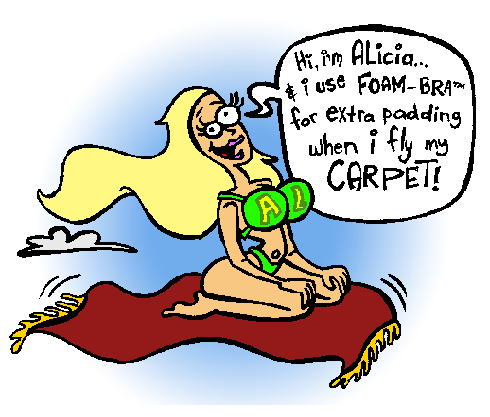
May 27, 2004
-----------------------------------------------
200 Words a Day Newzine #7
Contents
-----------------------------------------------
1. Watch Movies to pressure cook your language learning!
2. Spanish Tip: Do Hispanics say Americans are DENSE?
3. French Tip: A green worm going towards a glass…
4. German Tip – etc = usw
5. Getting to Alpha. (1)The Alpha Brainwave State & Learning.
6. Here is a Spanish Memory Trigger for you
7. and a French Memory Trigger for you
-----------------------------------------------
Watch Movies to pressure cook your language learning!
-----------------------------------------------
Here is a great technique for more advanced language learners, that is once you have over 1,000 words of vocab and understand most verb structures.
Watch movies.
Avoid an English movie dubbed into the foreign because the lips are all out of synchronisation, the expressions are non-genuine etc. For example when you speak French your whole face and mouth contort in different ways to an English speaker. Your arms should wave around more. You know what I mean.
Anyway here is how to do it.
Get the foreign DVD, or video starring their most popular actors. (Amazon has lots of foreign movies if you go to the amazon site in that respective language).
Get a pad of paper, pen, dictionary, beverages of your choice, writing area, and, if possible a fluent speaker of the language, who can sit with you and translate.
First just watch the movie once through to get the feel of it. Initially this may just sound like a whole lot of machine-gun fire.
Now second time round, write the phrases, and translate them as you go along. This is where it is great to have a fluent friend handy! Not only can they translate the rapid-fire burble, the slang, the colloquiallisms, the regionalisms, and such like, they can give you insights into the culture, the assumptions, the language, the double-entendres, the plays on words etc.
We recently watched Las Niñas de tus Ojos on DVD with our Spanish teacher Esther, who is a Madrileña (a famale native of Madrid, Spain) and her input was invaluable.
Following the movie was further compounded by the fact that each character was from a different part of Spain and had a different accent, and different sayings.
The main star was Penelope Cruz who played an Andalusian, there were Madrileños, Basques, Catalans and others. The Andalusian accent turns the ‘s’at the beginning of a word into a ‘th’, and the ‘s’ at the end of words is often completely dropped. Not easy for the Spanish learner!
With a remote control and lots of patience it may take some hours but you’ll have a transcript of the bits you didn’t understand, and then you are in a position to watch the movie again and again, gaining more and more understanding each time.
-----------------------------------------------
Spanish Tip: Do Hispanics say Americans are DENSE?
-----------------------------------------------
9 suffixes determine Nationality, and a US American is called a estadounidense.
If you find that a mouthful break it into three parts: estado – uni – dense. (pronounced estado – ooni – densay)
Words of Nationality in Spanish come with 8 suffixes and endings:
- a = belga. (the –a ending usually indicates a female of the nationality/region.
- ano = sevillano, mexicano, venezolano, africano, americano
- ense = estadounidense (US)
- eño = madrileño (from Madrid) , salvadoreño
- és = francés, inglés, portugués, danés
- í = marroquí (Morrocan)
- ino = chino (Chinese)
- -o = polaco, (Polish, Pole) ruso, (Russian) suizo (Swiss),
- ol = español
French Tip: A green worm going towards a glass…
-----------------------------------------------
What have the words in this sentence got in common?
A green worm going towards a green glass?
The French words for each sound exactly the same: they sound like VAIR.
- green – is * vert *
- worm – is * le ver *
- towards – is * vers *
- glass – is * le verre *.
(The green worm crawls towards the green glass.)…
…but in reality the French would deliberately avoid the alliteration (I’ll bet you didn’t think you’d hear that word again after leaving school!) and would say something like:
Le ver de couleur verte rampe vers le verre de couleur verte.
(Note the verte takes the feminine form of la couleur even though the worm and the glass are masculine).
-----------------------------------------------
a couple more words that sound a bit similar are:
-----------------------------------------------
- en vert = in green, coloured green
- en verre = made of glass
- envers = inverted, inside out,
- Anvers = Antwerp, the city in Belgium.
So for example you would say:
- La dame en vert. (the lady in green).
- La sculpture en verre. (the sculpture made of glass).
- Ta chemise est à l’envers. (your shirt is inside out).
- Le belge vient d’Anvers. (The Belgian man comes from Antwerp).
-----------------------------------------------
…speaking of glass
- le verre - is the substance, glass.
- a house window is la fenêtre. (As is a window on a computer…)
- a glass window in a shop is la vitrine.
- a glass window in a car is la vitre.
- the front windscreen/windshield on a car is called le pare-brise.
-----------------------------------------------
German Tip – etc = usw
-----------------------------------------------
Here is a common abbreviation in German: ‘usw’.
This is short for ‘und so weiter’ which means ‘etc’ or ‘and so on’ or ‘and ‘so forth’.
-----------------------------------------------
Getting to Alpha. (1)The Alpha Brainwave State & Learning.
-----------------------------------------------
Research shows us that when in a relaxed state the mind is more receptive to learning.
In a relaxed state your brainwaves take on the 'alpha' form of smooth wave patterns that allow information to ease into the long term memory and subconscious.
Californian accelerated learning innovator Charles Schmid called the state 'relaxed awareness'.
The ideal or optimal state according to him occurs where heart beat, breathing and brainwaves are smoothly synchronised, the body is relaxed but the mind concentrated and ready to receive new information (quoted in Gordon Dryden’s bestselling book The Learning Revolution 1993).
To achieve the relaxed state your language learning software should incorporate (i) breathing synchronising tools (ii) music.
There are various ways to relax. Certain classical Baroque music pieces can assist this without effort on behalf of the listener. These tend to be the largo movements at about 60 beats per minute in 3 / 4 time or 4 / 4 time. Some examples are (i) Vivaldi Four Seasons Winter-Largo, (ii) Vivaldi Concerto Opus 4 No 1 Largo, (ii) Corelli Concerto 8 Opus 6-Largo.
In coming newsletters we’ll look at other ways of reaching the ‘Alpha state.’
-----------------------------------------------
Here is a Spanish Memory Trigger for you
-----------------------------------------------
'Carpet' or 'rug' in Spanish is la alfombra....
...so imagine a lady called Alicia flying on a magic 'carpet' in her new ALL FOAM BRA.

-----------------------------------------------
and a French Memory Trigger for you
-----------------------------------------------
'Angry' in French is colère.
So imagine holding an angry man by the COLLAR....

That is it for this newsletter. See you next time.
Hasta la vista...À bientôt...Bis bald.
Kevin Crocombe & the 200 Words a Day Team
www.200words-a-day.com
The Team
Tom White; Odette; Nigel; Dominic; Albin Vidal; Maud Wojcik; Germain Tottet; Mariana Averza; Julia Watson; Eduardo Aceto; Maria Llorente; Chris White; Alan White.
-----------------------------------------------
School Site Licences are available for schools worldwide. Words in our courses cover the syllabus in most English-speaking countries.
UK Schools qualify for e-Learning Credits.
-----------------------------------------------
Trade enquiries are welcome.
-----------------------------------------------
200 Words a Day!
32 Alverton, Great Linford, Milton Keynes, Bucks, MK14 5EF, United Kingdom.
Tel: (+44) 1908 676 873
newzine@200words-a-day.com.
Language Learning 200 Words a Day!